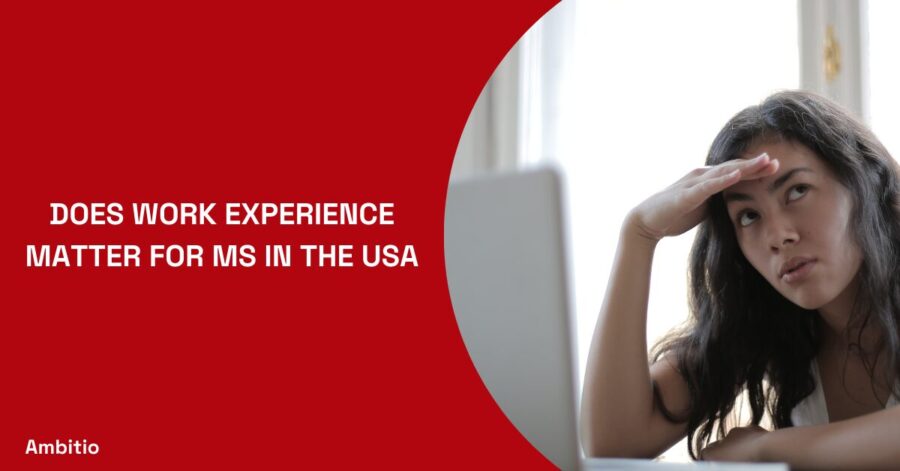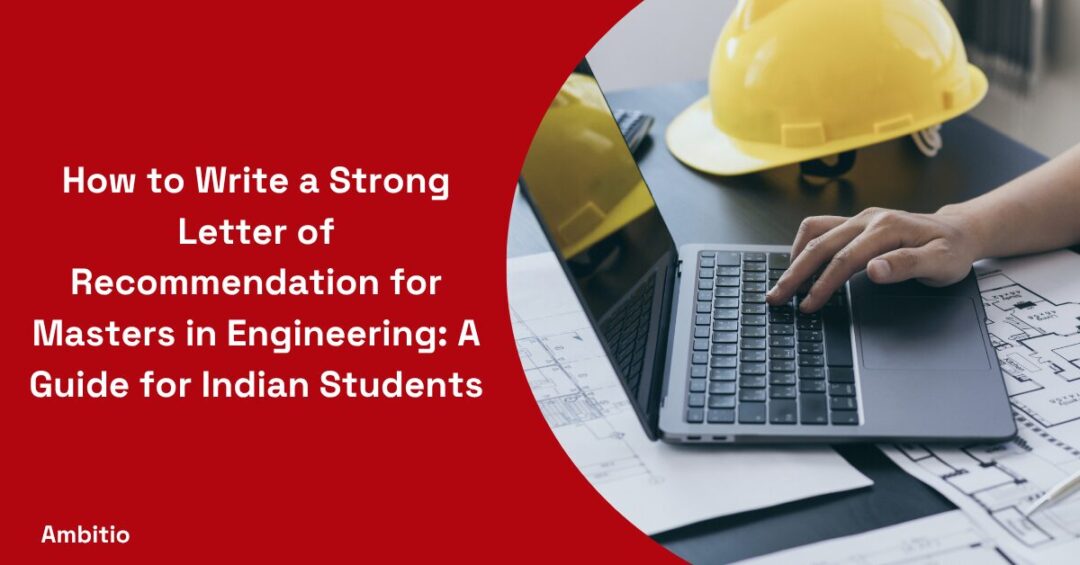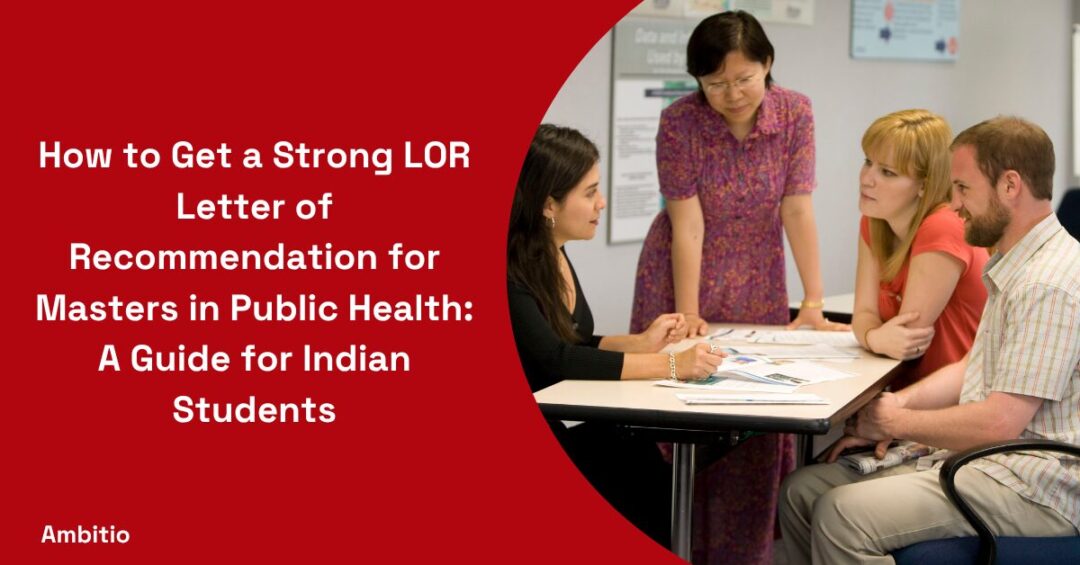12 December 2024
5 minutes read
Does Work Experience Matter for MS in the USA

Key Takeaways
- Work experience boosts MS applications in the USA.
- Its relevance varies by discipline, crucial for MBA and engineering.
- Enhances academic and research skills in MS programs.
- Provides a competitive edge in practical fields.
- A gap year for work experience can benefit MS admissions.
When aspiring to pursue a Master of Science (MS) in the USA, a critical element often comes into play: the significance of work experience.
This article explores the multifaceted role of professional experience in the MS application process, offering a comprehensive look at its impact across various study fields.
- Current Admission Trends: In the competitive arena of MS admissions in American universities, not only are academic credentials scrutinized, but the practical application of skills, as evidenced by work experience, is also a key factor.
- Balancing Perspectives: While fresh graduates may bring new theoretical insights, seasoned professionals add practical depth and diversity, making work experience a vital aspect for many admission committees.
Evaluating the Importance of Work Experience for MS in the USA

The value of work experience varies across disciplines and programs in the U.S. Its influence on admissions can be significant, depending on the field and the specific requirements of the program.
Quantitative Analysis
| Field of Study | Percentage with Work Experience | Typical Work Experience Duration | Key Types of Experience Valued |
|---|---|---|---|
| Engineering | 60% | 2-5 years | Industry projects, internships, research work in related fields |
| Business (MBA) | 85% | 3-6 years | Leadership roles, management experience, international business exposure |
| Humanities | 50% | 1-3 years | Research, internships, work in NGOs, teaching experience |
| Health Sciences | 75% | 2-4 years | Clinical experience, healthcare projects, research in health-related areas |
| Computer Science | 70% | 2-5 years | Software development, IT projects, technical internships |
| Arts and Design | 65% | 1-4 years | Creative projects, exhibitions, freelance work, industry experience |
| Environmental Science | 60% | 2-3 years | Environmental research, NGO work, internships in conservation organizations |
| Law | 80% | 3-5 years | Legal internships, paralegal work, clerking for judges |
| Education | 55% | 1-3 years | Teaching experience, educational program development, tutoring roles |
The Gap Year Debate: Impact on MS Applications
The decision to take a gap year, often to gain work experience, is a significant one. This section explores how such a gap is viewed by admissions committees.

Pros and Cons
| Pros of Work Experience | Cons of Work Experience |
|---|---|
| Enhances Applications: Demonstrates real-world application of skills. | Overemphasis Risk: May overshadow academic strengths. |
| Practical Skills: Valuable in graduate programs and future careers. | Academic Gap: Might need to refresh your academic knowledge. |
| Clearer Career Goals: Helps tailor MS studies effectively. | Age and Peer Differences: Adjusting to being with younger peers. |
| Stronger SOP/Recommendations: Concrete experiences enrich applications. | Work-Study Balance: Challenges in managing time and job commitments. |
| Scholarship Opportunities: Work history may increase financial aid chances. | Financial Implications: Includes income loss and tuition costs. |
Is Work Experience Necessary for MS in the USA
Did You Know?
85% of MBA applicants in the USA have 3-6 years of work experience, underscoring the critical role of professional background in business-related graduate programs.
Expert Opinions
Gathering insights from academic professionals and admissions experts, the following points highlight the perceived value of work experience in MS applications:
- Dr. Jane Smith, Admissions Director at a Renowned Tech University:
- Emphasizes the importance of work experience in technical fields for practical problem-solving skills.
- Notes that candidates with work experience often show better adaptability to rigorous academic environments.
- Professor John Doe, MBA Program Coordinator:
- States that work experience is crucial for MBA applicants, as it demonstrates real-world business acumen.
- Observe that students with professional backgrounds often contribute more substantially to class discussions and group projects.
- Dr. Emily Johnson, Faculty of Social Sciences:
- Highlights that work experience in fields like social work, education, or non-profits can provide critical context to theoretical learning.
- Believes that practical experience can lead to more focused research interests and a clearer career path post-graduation.
- Dr. Alan Green, Department Head of Engineering:
- Points out that work experience in engineering projects or internships can significantly enhance a candidate’s understanding of the subject matter.
- Mentions that candidates with industry experience often have a clearer idea of how to apply academic concepts in real-world scenarios.
- Ms. Laura Brown, Career Services Advisor:
- Advises that work experience can be a differentiating factor in highly competitive programs.
- Suggests that candidates use their professional background to showcase leadership skills and teamwork in their applications.
- Dr. Rachel White, Dean of Health Sciences:
- Notes the value of clinical or research experience in health-related fields for a deeper understanding of practical challenges.
- Encourages applicants to highlight any work experience that demonstrates commitment to the healthcare sector.
In the landscape of MS admissions, professional experience is not just a plus; it’s a differentiator.
– Ms. Laura Brown, Career Services Advisor.
Work Experience Relevance in Different Fields

The relevance of work experience in MS applications can vary significantly based on the specific field of study. Below is an expanded view of how different fields value professional experience.
Engineering and Sciences
- Practical Application: Highly valued as it demonstrates the ability to apply theoretical knowledge.
- Research Experience: Especially relevant for research-focused programs or those with a thesis component.
- Industry Projects: Provides an edge in fields like software engineering, mechanical engineering, etc.
- Case Study Example: An applicant with two years in a tech startup may have an advantage in Computer Science programs.
Business and Management
- Essential Component: Almost mandatory for MBA programs.
- Leadership Roles: Experience in management or entrepreneurial ventures is particularly appreciated.
- International Exposure: Global work experience can be a significant asset.
- Case Study Example: An applicant with three years of experience in a multinational company stands out in Business Analytics or MBA applications.
Humanities and Social Sciences
- Varied Importance: Depends on the nature of the program.
- Research and Publications: Experience in research, writing, or relevant internships can be beneficial.
- Community Involvement: Work in NGOs or social enterprises can strengthen applications.
- Case Study Example: Experience as a teacher or social worker can be advantageous for programs in Education or Social Work.
Health Sciences
- Clinical Experience: For fields like Public Health, prior work in healthcare settings is highly regarded.
- Research Projects: Involvement in health-related research can be a significant plus.
- Patient Interaction: Demonstrates practical skills and empathy, crucial for fields like Nursing or Psychology.
- Case Study Example: A nurse applying for an MS in Public Health with field experience would have a considerable advantage.
Arts and Creative Fields
- Portfolio Development: Work experience that contributes to a rich portfolio is crucial.
- Creative Projects: Real-world experience in artistic projects or performances.
- Industry Connections: Networking and collaboration experiences can open opportunities during and post-study.
- Case Study Example: A graphic designer with agency experience would have a strong application for an MS in Visual Communications.
Work experience is the bridge between theoretical knowledge and real-world application.
– Dr. Jane Smith, Admissions Director
Conclusion
In summary, work experience is a significant asset for MS applications in the USA. It enhances your application, providing practical skills and real-world perspectives that are highly valued by admissions committees.
While its importance varies across fields, effective presentation of professional experience can be a decisive factor in your MS journey, often tipping the scales in your favor.
As higher education evolves, the role of work experience in shaping successful MS applicants remains increasingly pivotal.
Elevate Your MS Application: Leverage your work experience to stand out in the competitive landscape of MS admissions in the USA.
Schedule Your Expert Call Now: Ready to navigate the college application process with ease? Schedule a call with our mentor at your convenience. We’re here to offer personalized solutions and expert guidance.
Is work experience mandatory for applying to MS programs in the USA?
It depends on the program and field of study. While not always mandatory, having work experience can significantly enhance your application, especially for programs like MBA.
How much work experience is typically required for MS applications?
There’s no one-size-fits-all answer. Some programs value a few months of internships, while others prefer several years of full-time work, particularly for professional courses like an MBA.
Does the field of my work experience need to be related to my intended MS program?
Relevant work experience is highly beneficial as it demonstrates your commitment and interest in the field. However, any professional experience can still be valuable if presented effectively.
Can a gap year with work experience compensate for a lower academic record?
A gap year filled with relevant professional experience can sometimes offset a slightly lower GPA by showcasing your practical skills and maturity.
How can I highlight my work experience in my MS application?
Use your Statement of Purpose (SOP) to articulate how your experience has prepared you for graduate studies. Letters of recommendation from employers can also validate your professional achievements.
Will work experience impact my chances of receiving financial aid or scholarships?
Work experience can be a positive factor for scholarships, especially those that value professional achievements and leadership potential.
Is internship experience considered as valuable as full-time work experience?
Internships are valuable, especially if they are relevant to your field of study. They demonstrate your initiative to gain industry exposure.

You can study at top universities worldwide!
Get expert tips and tricks to get into top universities with a free expert session.
Book Your Free 30-Minute Session Now! Book a call now




























